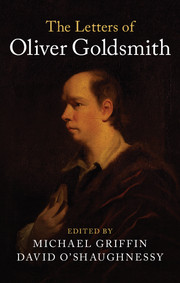22 - To Dr George Baker and Others, [London, 20 January 1767]
Published online by Cambridge University Press: 12 December 2024
Summary
Dr George Baker (bap. 1723, d. 1809), physician, was elected a fellow of the College of Physicians in 1757. He settled in London in 1761, where his patients included George III, Queen Charlotte and Joshua Reynolds. He had charge of the king’s health during his period of mental illness from 1788. He was well known for his literary talents, particularly his Latin prose and epigrams, and one tradition identifies him as the dedicatee of Thomas Gray's ‘Elegy Written in a Country Churchyard’ (1751). He caused significant controversy with his Essay Concerning the Cause of the Endemical Colic of Devonshire (1767), which linked colic to the use of lead in the processing of cider; although there was much scepticism, he was eventually proved right. He continued his research into lead poisoning and corresponded with Benjamin Franklin on the topic. He retired in 1798.
We date the letter 20 January 1767: this is conjectural and based on the internal evidence of the letter-poem. Balderston conjectures that the date was May 1769 but she relied on Forster. He claimed that the complimentary lines on Reynolds and painting sensation Angelica Kauffman (1741–1807) in the Public Advertiser, referred to in the final line, appeared in the newspaper the same day as the advertisement for Goldsmith's Roman History (18 May 1769). However, as noted by Wardle and others, the lines composed by ‘An ADMIRER of MERIT’ were actually published in the Public Advertiser on 20 January 1767. The eulogium was prompted by Kauffman's celebrated portrait of Reynolds, begun in October 1766 and completed in early 1767, and compares it to her portraits of Anne Seymour Conway (1749–1828) and probably Anne Hussey, Lady Stanhope (1737–1812). The poem's reference to Charles Horneck's intention to enlist also supports this earlier date (see n11 below).
The copy-text is the manuscript owned by Loren R. Rothschild, Los Angeles (reproduced in his Verses in Reply to an Invitation to Dinner at Dr. George Baker’s (Los Angeles: Rasselas Press, 1994)). A version of the poem was first published in Prior's Miscellaneous Works of Goldsmith (London: John Murray, 1837), IV: 132–3. This version, used by all editors of Goldsmith's works until now, is based upon the copy given to Prior by Major General Sir Henry Bunbury, son of Catherine Bunbury née Horneck, and diverges in several instances from the original given here.
- Type
- Chapter
- Information
- The Letters of Oliver Goldsmith , pp. 65 - 69Publisher: Cambridge University PressPrint publication year: 2018

